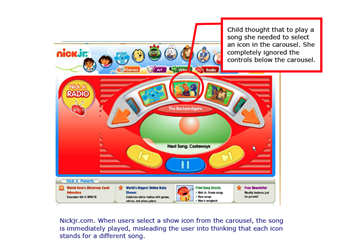The Web is inconceivable without search engines. Particularly people search takes a large share. Our latest blog post showed, that some names can be quite dangerous to search for. Liz Gannes wrote an interesting post on gigaom.com concerning children and their use of the web. An usability study shows that kids use the web and search engines quite different than adults. The Nielsen Norman Group Report: Usability of Websites for Children is based on usability research with 90 children. The test showed how children use real sites designed for children as well as their use of the kids’ areas of mainsteam websites. Quite interesiting results:
While adult web users are increasingly using search engines to navigate through the web, kids navigate the web using bookmarks, remembering their favorite sites, and accessing paid subscription content and games. The report makes it seem as if kids have more of an app mentality than a search mentality when compared to adults. Children also respond better than adults to sound, animation, and characters. And: Kids today use the web primarily for entertainment! Hopefully, this will change while getting older…
We hope, that Yasni is accessible by users of any age!

